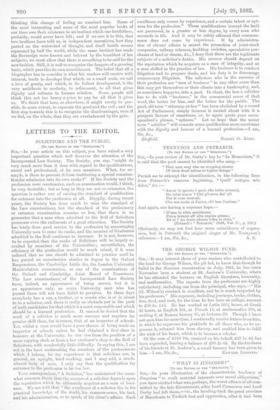LETTERS TO THE EDITOR.
SOLICITORS AND THE PUBLIC.
. [TO TEE EDITOR or THE "SPECTATOR."]
Ssa,—In your article on this subject, you have raised a very important question which well deserves the attention of the Incorporated Law Society. The Society, you say, "might do very much more than it does with regard to the qualifications, moral and professional, of its own members. What, for ex- ample, is there to prevent it from instituting a special examina- tion for admission into its own ranks ?" If the Society and the profession were coextensive, such an examination would, I think, be very desirable ; but so long as they are not co-extensive, the question is rather one of raising the standard of qualification for entrance into the profession at all. Happily, during recent years, the Society has done much to raise the standard of the Law examinations, but the standard of the preliminary or entrance examination remains so low, that there is no guarantee that a man when admitted to the Roll of Solicitors possesses even the rudiments of a good education. The Society has lately done good service to the profession by encouraging University men to enter its ranks, and the number of Graduates admitted to the Roll continues to increase. It is not, however, . to be expected that the ranks of Solicitors will be largely re- cruited by members of the Universities ; nevertheless, the efficiency of the profession would be much raised, if it were ordered that no one should be admitted to practice until he has passed an examination similar in degree to the Oxford Responsions, the Cambridge Little Go, the London University Matriculation examination, or one of the examinations of the Oxford and Cambridge Joint Board of Examiners. The Law examinations: of the Incorporated Law Society have, indeed, an appearance of being severe, but it is an appearance only, as every University man who has passed them will not have failed to perceive. In these days everybody has a son, a brother, or a cousin who is or is about to be a solicitor, and there is really no obstacle put in the path of unfit candidates for that which is a most responsible and which should be a learned profession. It. cannot be denied that the work of a solicitor is much more onerous and requires far greater skill than, for instance, that of an inspector of schools. Yet, whilst a man would have a poor chance of being made an inspector of schools unless he had obtained a first-class iu honours at the University, he can rise from the position of a mere copying clerk or from a law stationer's shop to the Roll of Solicitors, with wonderfully little difficulty. In saying this, I am not in the least underrating the members of the profession to which I belong, for my experience is that solicitors are, in general, an upright, hard working, and I may add, a much- abused body of men. I only say that the qualification for entrance to the profession is far too low.
Your correspondent," A Solicitor," has maintained the some- what common thesis that the success of a solicitor depends upon the reputation which lie ultimately acquires as a man of busi- ness. We are told that "the excellence of a solicitor lies in his practical knowledge of the world., his common-sense, his tact, and his administration, so to speak, of his client's affairs. Such excellence only comes by experience, and a certain talent or apt- ness for the profession." These qualifications (except the last) are possessed, in a greater or less degree, by every man who succeeds in life. And it may be safely affirmed that common- sense does not come by experience. If by administra- tion of clients' affairs is meant the promotion of joint-stock companies, railway schemes, building societies, speculative pur- chases of land. or shares, &c., I deny that these are the legitimate subjects of a solicitor's duties. His success should depend on the reputation which he acquires as a man of integrity, and as a man skilled in the practice of law. His business is to conduct litigation and to prepare deeds, and his duty is to discourage unnecessary litigation. The solicitors who in the exercise of their profession are "men of business" in any other sense than this may get themselves or their clients into a bankruptcy, and as sometimes happens, into a gaol. In short, the less a solicitor has to do with "business," in the commercial sense of that word, the better for him, and the better for the public. The good, old term " attorney-at-law " has been abolished by a recent Act of Parliament, simply because it carried about with it a pungent flavour of smartness, or, to again quote your corre- spondent's phrase, "aptness." Let us hope that the newer term " solicitor " will connote some qualification more consistent with the dignity and honour of a learned profession.—I am, Sir, dsc.,


































 Previous page
Previous page